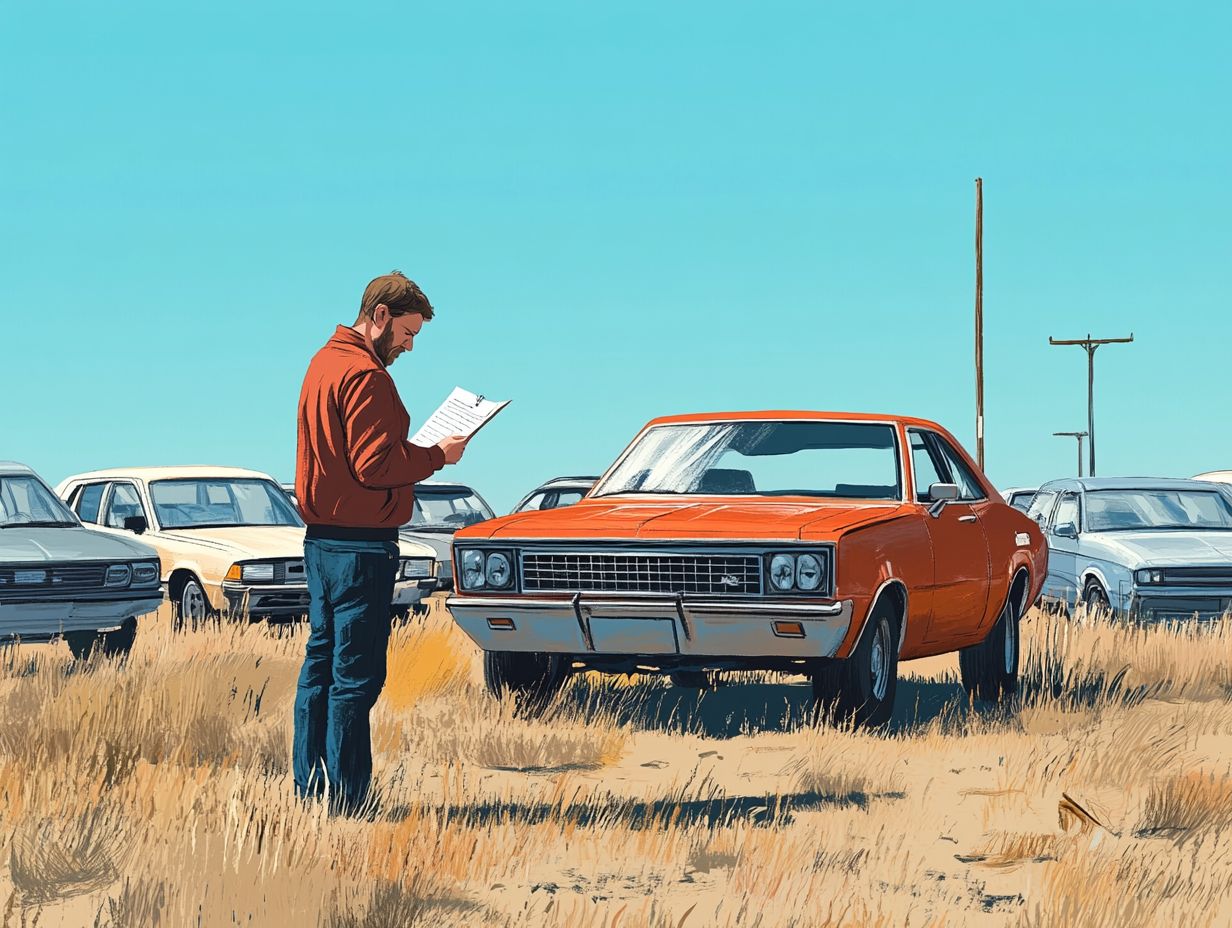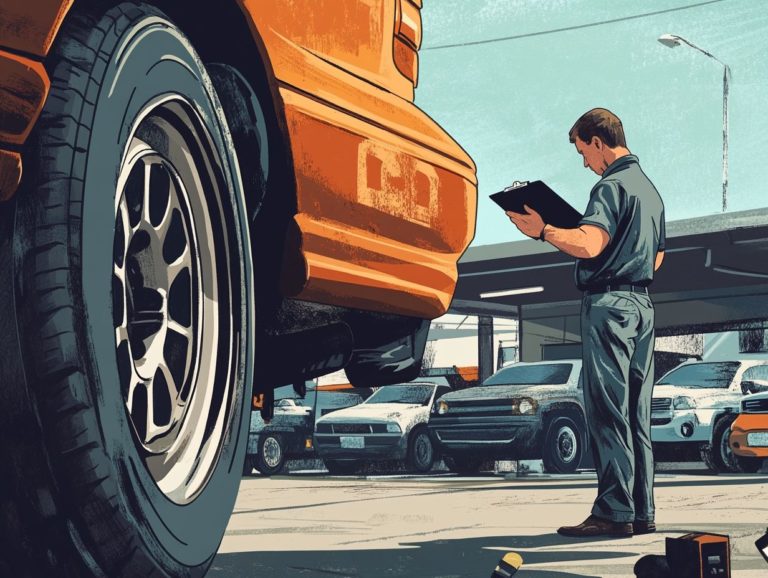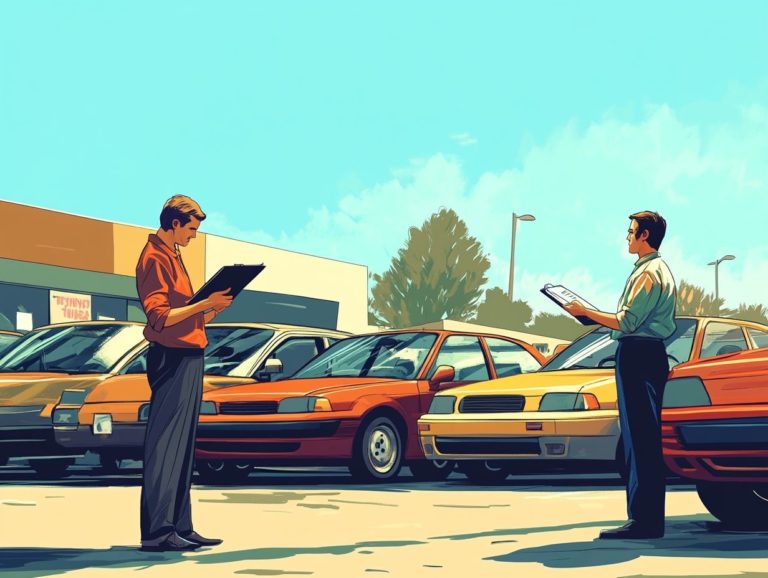7 Essential Questions to Ask When Buying Used
Buying used items can be a clever approach to save money while uncovering unique treasures, though it comes with its own set of challenges.
To make this process easier, consider these seven essential questions before making a purchase. From knowing the item’s condition to verifying authenticity and exploring warranty options, these guidelines will empower you to make informed decisions.
Whether you’re on the lookout for vintage collectibles or practical everyday items, these tips will help you shop smartly and with confidence.
Contents
- Key Takeaways:
- 1. What Is the Condition of the Item?
- 2. How Old Is the Item?
- 3. Has the Item Been Repaired or Refurbished?
- 4. Does the Item Come with a Warranty?
- 5. What Is the Seller’s Return Policy?
- 6. Is the Item Authentic?
- 7. How Much Is the Item Worth?
- What Are the Advantages of Buying Used?
- Frequently Asked Questions
- How Can You Ensure the Quality of a Used Item?
- What Are the Best Places to Buy Used Items?
- What Are the Most Commonly Purchased Used Items?
- What Are the Factors to Consider When Negotiating the Price of a Used Item?
- What are the 7 essential questions to ask when buying used?
- Why is it important to ask about the vehicle’s history?
- How can I determine the condition of the vehicle?
- What should I consider when looking at the mileage on a used vehicle?
- What should I know about the vehicle’s accident history?
- What features and options should I ask about when buying a used vehicle?
- Is it important to know the price and available warranty or return policy before buying a used vehicle?
Key Takeaways:

Always inquire about the item’s condition before making a purchase to ensure it meets your expectations.
Consider the age of the item to determine its potential lifespan and any potential repair costs.
Find out if the item has been repaired or refurbished to understand its current state and potential issues.
1. What Is the Condition of the Item?
Knowing the condition of a used car is key to a great buy, especially when you’re considering Lemon Laws, which protect buyers if their car has significant problems, and assessing the vehicle’s mechanical issues, accident history, and overall condition.
A thorough evaluation goes beyond a simple visual inspection. Obtain a detailed vehicle inspection report that highlights potential problems and confirms the car’s performance status.
Delve into service records to verify consistent maintenance, a strong indicator of reliability. Assess the seller’s honesty by asking direct questions and observing their demeanor for any signs of hesitation.
Also, consider the reputation of the dealership or individual seller, as this can provide invaluable insights into their trustworthiness and boost your confidence in making that purchase.
2. How Old Is the Item?
The age of a used car plays a significant role in its depreciation rate and overall value, so it s crucial to consider the vehicle’s history and how mileage impacts your purchase decision.
As a vehicle ages, it naturally loses value, and this depreciation often accelerates after certain milestones, such as the first few years of ownership. Understanding whether the original owner maintained the car properly can give you valuable insight into its current condition and future reliability.
The total mileage on a vehicle is key in determining its market value; higher mileage typically suggests more wear and tear, which could lead to costly repairs later on. Be thorough in evaluating these factors to ensure you make a well-informed investment.
3. Has the Item Been Repaired or Refurbished?
A comprehensive understanding of a used car’s repair history is essential, as it can unveil potential mechanical issues and clarify the dealership’s obligations, including any applicable warranty on defects.
By closely examining past repairs, you can identify red flags such as recurring problems with the same components or the absence of regular maintenance records. These signs often indicate that the vehicle may harbor underlying issues that could lead to expensive repairs in the future.
Transparency regarding the repair history fosters trust between you and the seller and ensures that any defects are addressed before the sale is finalized.
Ultimately, a meticulously documented repair record is your best ally in making informed decisions and steering clear of future complications.
4. Does the Item Come with a Warranty?
Understanding the type of warranty that accompanies a used car be it a dealership warranty, factory warranty, or extended warranty is essential for protecting your rights as a buyer and ensuring you enjoy long-term satisfaction with your purchase.
Each warranty type offers distinct levels of coverage, allowing you to select the option that aligns best with your needs. A dealership warranty usually covers defects and repairs for a specific duration, while a factory warranty, provided by the manufacturer, may encompass comprehensive coverage on various parts and systems. An extended warranty can add extra peace of mind, extending protection beyond the initial coverage period.
It’s crucial to read the terms and conditions of each warranty. This will detail what is covered, any exclusions, and the claims process. Armed with this knowledge, you can make informed decisions and sidestep unexpected expenses down the road.
5. What Is the Seller’s Return Policy?

It’s important to understand the seller’s return policy. This lays out your rights and options in case any issues arise, especially when considering Lemon Laws, which protect buyers from defective vehicles, and any relevant cooling-off periods.
Knowing the return policy helps you handle issues better, such as receiving a defective product or discovering that an item doesn t quite meet your expectations.
Pay attention to the key components, including:
- The duration of the return window
- Any conditions for return eligibility
- Whether refunds, exchanges, or store credits are offered
It’s also wise to consider how shipping costs for returns and any restocking fees are handled. These factors can significantly affect your overall expenses.
By checking these factors, you can confidently make great choices!
6. Is the Item Authentic?
To ensure the authenticity of a used car, you need to verify its vehicle title, check for odometer fraud, and ask the right questions to foster transparency in the sales process.
Start by examining the vehicle identification number (VIN), which serves as a unique code holding essential insights into the car’s history. Be vigilant for any discrepancies in the VIN, as these can raise potential red flags.
It s also wise to ask about maintenance records and any previous accidents to get a clearer picture of the vehicle’s condition.
By concentrating on these critical elements, you can significantly mitigate the risk of falling prey to fraud, paving the way for a more informed and trustworthy transaction experience.
7. How Much Is the Item Worth?
Determining the worth of a used car demands a keen eye and diligent market research. You should utilize resources like Kelley Blue Book and J.D. Power to assess the asking price and ensure a fair vehicle valuation.
Beyond these invaluable tools, it’s essential to factor in elements such as the car’s make and model, mileage, overall condition, and any modifications that might enhance its desirability.
When you’re comparing prices, take the time to explore listings on platforms like Craigslist, AutoTrader, and CarMax. Doing so will provide you with insights into various pricing trends.
Understanding local market dynamics is equally crucial. Demand can fluctuate significantly from one region to another, influencing how much buyers are willing to pay for a specific vehicle.
This nuanced understanding can empower you to make informed decisions in your quest for the perfect used car.
What Are the Advantages of Buying Used?
Buying a used car comes with a wealth of advantages, such as less financial strain, lower insurance premiums, and the opportunity to sidestep the steep depreciation that new vehicles experience. It s truly a savvy choice for your next car purchase.
Beyond these benefits, choosing a pre-owned vehicle can result in significant cost savings. For example, choosing a certified pre-owned car can save you from hidden issues and costly repairs later!
Plus, purchasing a used car frequently means you have access to a known service history, giving you the ability to make informed decisions based on prior maintenance records.
This not only boosts your confidence in the vehicle’s reliability but also aids in planning for future repair costs, ultimately paving the way for a more economical ownership experience.
What Are the Risks of Buying Used?
While purchasing a used vehicle can offer distinct advantages, it also comes with its fair share of risks, including undisclosed mechanical issues, hidden accident histories, and the challenge of spotting red flags that might suggest seller dishonesty.
As a potential buyer, it s crucial to remain vigilant regarding these risks, as they can lead to unexpected repairs and costs down the road.
For instance, a vehicle that shows signs of significant wear and tear may reveal troubling issues only after you’ve made the purchase, especially if it has a concealed accident history.
Watch for signs of misrepresentation, such as inconsistent mileage readings or overly polished paint jobs, which can signal a less-than-honest seller.
To navigate these challenges effectively, you can employ savvy negotiation strategies by conducting comprehensive research on the vehicle’s history and using any discrepancies you uncover to negotiate a fairer price.
Frequently Asked Questions
How Can You Ensure the Quality of a Used Item?

Ensuring the quality of a used car requires careful steps. Conduct a thorough vehicle inspection, review a CarFax report, and check the service records to assess the mechanical condition and the dealership’s commitments.
Diving deep into the maintenance history will help you understand how well the vehicle has been cared for over time. It’s vital to check if regular oil changes and necessary repairs were performed, as this directly affects performance and longevity.
Securing a comprehensive vehicle inspection report is essential before finalizing any purchase. This report sheds light on the current state of the car and uncovers hidden issues that may need your attention.
By following these steps, you empower yourself to make a well-informed decision and steer clear of costly surprises down the road.
What Are the Best Places to Buy Used Items?
Finding the best places to buy used cars involves exploring various options, including reputable used car dealers, online classifieds, and private sellers.
Conducting thorough market research is essential for making an informed decision. Each avenue has its advantages and disadvantages.
Used car dealers often provide warranties and financing options, but their prices may be higher than private sales. Online classifieds offer a broader selection and potentially better prices, but you need to ensure the seller’s legitimacy.
Private sellers might seem like the most budget-friendly option, yet they often lack the transparency that dealerships provide. Evaluating the reputation of these options is crucial.
Consider customer reviews, ratings on platforms like Google or Yelp, and recommendations from friends to gather valuable insights. Start by checking local dealerships, browsing online marketplaces, and engaging in community forums to gather diverse opinions.
What Are the Most Commonly Purchased Used Items?
Used cars rank among the most frequently purchased items. As a savvy buyer, you’ll focus on factors such as vehicle history, the number of previous owners, and the overall condition of the car to inform your decision-making.
Certain models consistently attract attention for their reliability, fuel efficiency, and affordability.
Take the Honda Civic, for instance; it’s often praised for its longevity and smooth handling, making it a favorite for first-time buyers and those looking to upgrade. Similarly, the Toyota Corolla stands out for its low-maintenance reputation and impressive resale value.
Compact SUVs like the Nissan Rogue and the Ford Escape have surged in popularity, appealing to families and individuals who seek both practicality and style.
Market trends suggest that these vehicles cater to diverse needs while delivering exceptional value, making them highly desirable across various buyer demographics.
What Are the Factors to Consider When Negotiating the Price of a Used Item?
When negotiating the price of a used car, several key factors should be considered.
First, closely examine the asking price, assess the vehicle’s valuation using market data, and check if a dealership warranty is included.
Gather comprehensive information about the vehicle’s history, including previous accidents, maintenance records, and the duration of ownership by the last seller.
Understanding the vehicle’s condition, both mechanically and aesthetically, gives you valuable leverage in discussions.
Research similar models and their prices in your area to establish a solid baseline for negotiations.
By arming yourself with knowledge, you can present a compelling case for a fairer price, especially when you uncover issues or discrepancies that might impact the car’s overall value.
What are the 7 essential questions to ask when buying used?

The 7 essential questions are:
- What is the vehicle’s history?
- What is the vehicle’s condition?
- What is the mileage?
- Has the vehicle been in any accidents?
- What features does the vehicle have?
- What is the price?
- Is there a warranty or return policy?
Why is it important to ask about the vehicle’s history?
Asking about the vehicle’s history provides key information about its past ownership and maintenance. It can also reveal if the vehicle has been in any accidents or has outstanding recalls.
How can I determine the condition of the vehicle?
You can check the vehicle’s condition by inspecting it yourself or having a mechanic do a thorough check. Ask for maintenance or repair records to see how well the vehicle has been maintained.
What should I consider when looking at the mileage on a used vehicle?
Mileage indicates how much wear and tear the vehicle has experienced. Higher mileage may mean more maintenance and repairs, while lower mileage could offer a better resale value.
What should I know about the vehicle’s accident history?
Knowing the vehicle’s accident history helps you spot any underlying issues or safety concerns. It can also affect its resale value and insurance rates.
What features and options should I ask about when buying a used vehicle?
It s important to know what features the vehicle includes to ensure it meets your needs. This could involve safety features, technology, and comfort options.
Is it important to know the price and available warranty or return policy before buying a used vehicle?
Absolutely! Knowing the vehicle’s price and available warranty is crucial. This knowledge empowers you to negotiate confidently and protects you from unexpected issues!






